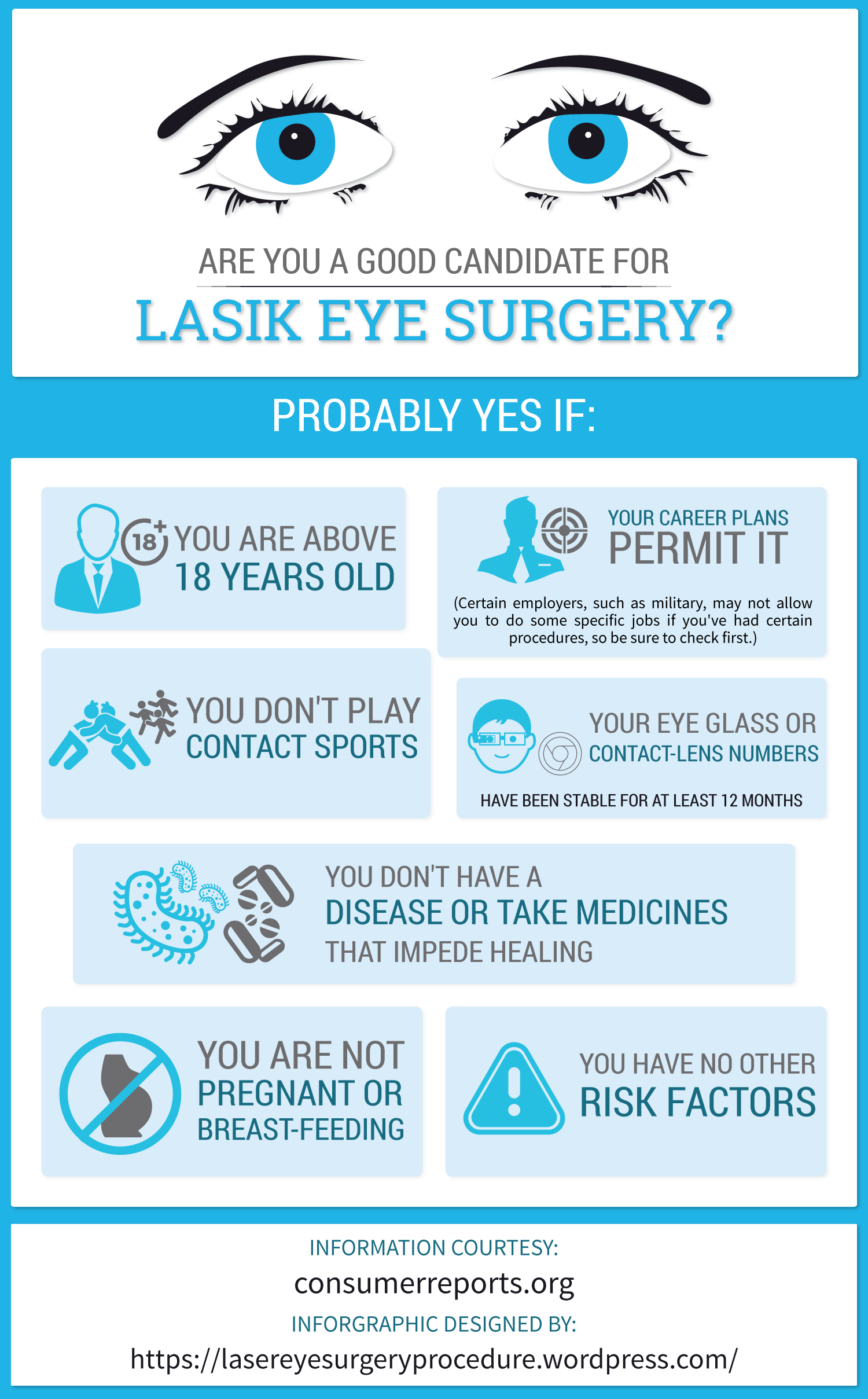Frequently Asked Questions About Lasik Eye Surgical Procedure

Content written by-Singh Rooney
Prior to LASIK, your eye doctor will check your vision to ensure it is stable. She or he will likewise examine to see if you have any other eye issues that might impact your results.
After the eye doctor has actually applied numbing eye decreases, he or she will certainly produce a paper-thin flap in your cornea tissue making use of a tool called a microkeratome or laser. The treatment is painless.
What Is LASIK?
LASIK is a type of refractive surgical treatment. It remedies vision issues triggered by refractive errors, which take place when the cornea or lens don't properly bend light rays.
Many people that have LASIK attain good range vision without glasses or contacts. However, they might need reading glasses to see close. The results of LASIK are irreversible, although aesthetic side effects are momentary.
Can I Have LASIK if I Have Astigmatism?
Blurry vision is often brought on by astigmatism. LASIK can aid with this issue by making your cornea more balanced. The doctor will make use of a tool called a microkeratome or laser to reduce a thin flap in your cornea, then fold it back. They will certainly then make use of a laser to improve the cornea so it can bend light much better.
The only thing that LASIK can't do is appropriate presbyopia (age-related farsightedness). This can only be made with cataract surgical treatment.
Can I Have LASIK if I Have Dry Eye?
A crucial part of the LASIK evaluation is testing how well your eyes produce tears. Some people with dry eye are not able to obtain LASIK since it can worsen the problem.
Dry eye is an usual negative effects of LASIK due to the fact that the treatment cuts corneal nerves. Nonetheless, it typically boosts as the eye heals. You can use artificial tears and punctal plugs to manage your signs.
Can I Have LASIK if I Have a Cataract?
For the most part, yes. LASIK can enhance your vision after cataract surgery.
When you have a cataract, your lens is gloomy as well as your close-up vision is blurry. https://blogfreely.net/tuan74luise/the-perks-of-lasik-eye-surgical-procedure-a-comprehensive-overview can help with this, along with your range vision.
Throughout LASIK, your specialist will utilize a laser or a blade to develop a slim flap on your cornea. After that the surgeon will fold the flap back and utilize a laser to improve your cornea.
Can I Have LASIK if I Have a Retinal Detachment?
Retinal detachment usually results from a retinal tear. The physician will fix the tear with an in-office procedure called pneumatic retinopexy. After the eye is numbed, the physician inserts an expanding gas bubble right into the eye to press the removed retina against its support cells.
LASIK doesn't right presbyopia, which establishes as you grow older and triggers blurred close-up vision. Nonetheless, it can be combined with mono-vision to minimize or eliminate the demand for reviewing glasses.
Can I Have LASIK if I Have a Hyperopia (Farsightedness) or Nearsightedness (Nearsightedness)?
A lot of health insurance firms do not cover LASIK since it isn't thought about medically required. Nevertheless, they may repay people for lens implants if a cosmetic surgeon is part of their network.
Before LASIK Or Laser Eye Surgery undertake LASIK, your ophthalmologist will certainly do a detailed eye examination. This will certainly include checking your general eye wellness, pupil dimension as well as refractive mistake. He or she will also determine the density of your corneas.
Can I Have LASIK if I Have Presbyopia (Aging Eyes)?
LASIK does not deal with presbyopia (loss of near vision associated with age). Instead, it deals with refractive mistakes by improving the cornea.
After numbing decreases and also covering the eye with a guard or spot, the cosmetic surgeon develops the flap. Then Suggested Internet page reshapes the cornea. You may listen to a clicking noise and smell an uncommon scent. This is normal and does not create injury.
Can I Have LASIK if I Have Keratoconus (Rounded Cornea)?
In LASIK, your surgeon will certainly utilize a femtosecond laser to cut a thin flap in the cornea. They will certainly then fold it back and also use a different laser to improve your cornea.
Your vision is based on exactly how light enters your eye, flexes via the lens and focuses on the retina. Refractive mistakes maintain light from concentrating effectively and also cause blurred vision.
Can I Have LASIK if I Have Blepharitis (Swelling of the Eyelids)?
The majority of people select LASIK due to the fact that they desire freedom from glasses or get in touch with lenses. It is essential to discuss your goals with your ophthalmologist prior to having the procedure.
LASIK is not unpleasant. Eye decreases are placed to numb your eyes prior to the surgical treatment. Most individuals explain feeling a mild stress however no discomfort. Healing from LASIK is relatively quick. Your vision will certainly be a little fuzzy as well as light delicate right after surgery but should enhance quickly.
Can I Have LASIK if I Have a Corneal Density Concern?
LASIK deals with vision by reshaping the corneal cells. To do this, the cornea must be thick enough for the doctor to create a flap.
If your corneas are too thin, you might be a candidate for laser vision adjustment treatments that do not call for developing a flap, such as PRK or Epi-LASIK. These procedures have comparable outcomes to LASIK but operate in a different way.

